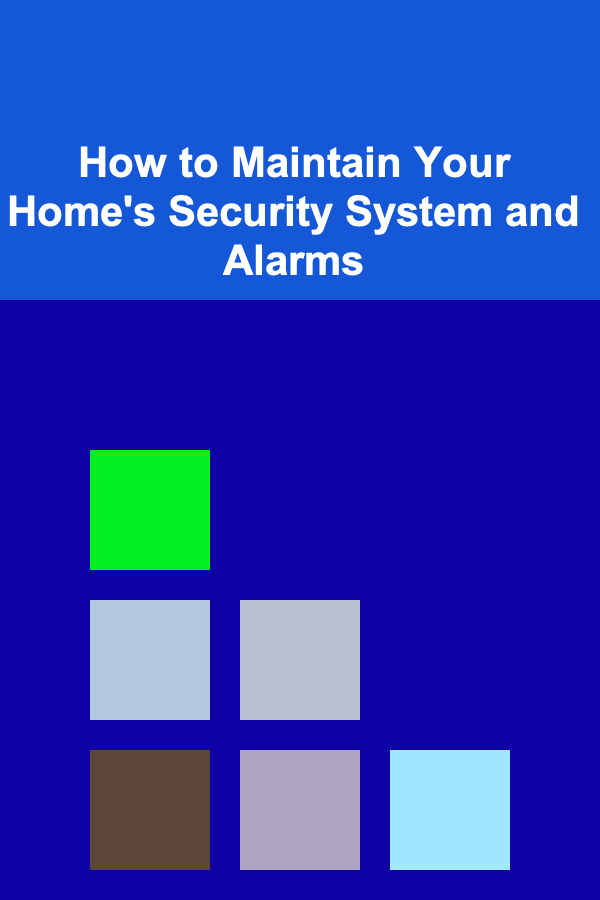
How to Maintain Your Home's Security System and Alarms
ebook include PDF & Audio bundle (Micro Guide)
$12.99$5.99
Limited Time Offer! Order within the next:

Home security is one of the most important aspects of ensuring your family's safety and protecting your property. With increasing threats and criminal activity, a robust and effective home security system is crucial. However, having a security system is only part of the equation. Proper maintenance of your home security system and alarms is essential for it to function optimally when needed most. A malfunctioning system can be just as ineffective as having no system at all.
In this article, we'll explore the best practices for maintaining your home's security system and alarms, including regular checks, updates, and strategies to ensure that your system operates at peak efficiency, helping you to avoid system failures and possible security breaches.
The Importance of Maintaining Your Security System
A home security system typically consists of alarms, motion detectors, cameras, sensors, and control panels. Maintaining these components is essential to prevent malfunctioning, which could leave your home vulnerable to break-ins or other security threats. Let's look at the importance of maintaining your security system:
1. Preventing System Failure
The primary function of any security system is to provide reliable protection against intruders. If your system is not maintained, it may not work as expected in an emergency. Regular maintenance ensures that all components of your security system are functioning properly and effectively.
2. Ensuring the Safety of Your Home
A malfunctioning security alarm could be the difference between an intruder being caught or your home being burglarized. Proper maintenance ensures that your system's alarms will trigger when needed, keeping your home and loved ones safe.
3. Maximizing the Longevity of Equipment
Most security systems involve high-tech equipment that, if properly maintained, can last for years. However, neglecting regular upkeep can result in system failures, equipment damage, and costly repairs. Regular maintenance helps extend the life of your security system, saving you money in the long run.
4. Maintaining Compliance with Insurance Requirements
Some home insurance policies may offer discounts for homes with monitored security systems. To continue to receive these benefits, your system must remain operational. Insurers may require proof of a functional system, and failure to maintain your security equipment can result in the loss of coverage or discounts.
5. Keeping Up with New Technology
Security technology is constantly evolving. If you don't regularly maintain your system, you may miss out on new features that could improve security, such as better cameras, advanced motion detection, or enhanced monitoring capabilities. Regular updates help you stay ahead of emerging security threats.
Key Components of a Home Security System
Before diving into maintenance tips, it's important to understand the components that make up a typical home security system. Each of these elements requires specific care to ensure the overall functionality of the system.
1. Control Panel
The control panel is the "brain" of your home security system. It processes information from all sensors and alarm triggers and activates appropriate responses. Modern systems may have touchscreens, remote access, and wireless connectivity, making it important to keep the software updated and ensure the device is functioning properly.
2. Security Cameras
Security cameras are essential for monitoring your property. They help provide evidence in case of a break-in and can deter criminals from attempting to enter your home. Camera maintenance includes cleaning lenses, checking for any damage, and ensuring they have a clear view of important areas. Regular updates to camera software can also improve performance.
3. Motion Detectors
Motion detectors are critical for detecting intruders inside or near your home. They can activate alarms or send alerts when movement is detected. These devices need to be regularly cleaned, recalibrated, and tested to avoid false alarms or missed detections.
4. Door and Window Sensors
These sensors are placed on doors and windows to detect when they are opened. Regularly checking the battery levels, testing their functionality, and ensuring they are securely attached to doors and windows are necessary tasks for maintaining these sensors.
5. Alarms
The alarm itself is the final line of defense. It alerts you and the monitoring center if an intrusion occurs. Ensuring that alarms are loud, clear, and effective is a priority. Additionally, checking alarm batteries and ensuring the system is properly connected to monitoring services is vital.
6. Keypads and Remotes
Keypads and remote devices allow you to control and arm/disarm your security system. These need to be checked for functional buttons and any physical damage. Also, replacing the batteries in remote devices is important to ensure seamless operation.
7. Backup Power Supply
A power outage should not stop your security system from functioning. Most security systems have a backup power supply, typically a battery, that keeps the system running during power outages. It's essential to periodically check the battery life and replace the battery as needed.
Maintenance Tips for Home Security Systems
To keep your home's security system in optimal condition, here are key maintenance tips you should follow regularly.
1. Regularly Test the System
Testing the system ensures all parts are working as they should. You can perform a manual test of your home security system by triggering the alarm through various components---whether it's opening a door, setting off the motion sensors, or manually triggering the alarm. Testing helps identify any issues that may have developed, such as faulty sensors, communication errors, or unresponsive alarms.
- Monthly Tests: Ideally, test your system once a month.
- Communication Check: Test the communication between the control panel, monitoring center, and any app or mobile device.
- Professional Inspections: If you're unsure how to test the system properly, hire a professional to run diagnostics on your system.
2. Inspect and Clean Security Cameras
Over time, dirt, dust, and weather conditions can cloud the lenses of your security cameras. Regularly clean the camera lenses to ensure clear and high-quality footage. Here's how you can maintain your cameras:
- Wipe Lenses: Use a soft cloth to gently wipe away dirt and grime from camera lenses.
- Check Angles: Ensure that the cameras are correctly positioned and aligned to cover the desired areas.
- Check for Damage: Examine cameras for any visible damage or wear. If there are cracks or exposed wires, consider replacing the camera or contacting a technician.
3. Replace Batteries in Sensors and Alarms
The most common reason why alarms fail is because of dead batteries. Sensors and alarms rely heavily on batteries, and if they are not replaced regularly, you may face a malfunction in a critical situation.
- Test Battery Levels: Check battery levels every few months and replace batteries in sensors and alarm units as needed.
- Replace Backup Batteries: Don't forget the backup batteries in your control panel and other key components. Ensure they are charged and ready to keep the system running in case of a power outage.
4. Keep Your System Software Up to Date
Just like any other piece of technology, home security systems need software updates to ensure optimal performance. Manufacturers often release updates to improve security, fix bugs, and add new features.
- Check for Updates: If you have a smart security system that connects to your mobile app or the internet, make sure the system software is up to date. Often, your system will notify you if an update is available, but you can manually check your security provider's website as well.
- Update Passwords: Change passwords for system access regularly to enhance security and minimize the risk of unauthorized access.
5. Check and Test Motion Sensors
Motion sensors can accumulate dust or become misaligned, which can result in false alarms or missed detections. Regularly clean the motion sensors and check their functionality:
- Clean Sensors: Use a soft cloth to remove any dust or dirt from the sensor lenses.
- Test Sensitivity: Test the sensor by moving in front of it to ensure it's detecting motion properly.
- Adjust Placement: If the sensor is frequently triggered by pets or environmental factors (like sunlight), adjust its placement to prevent false alarms.
6. Ensure Alarm Sound Is Adequate
The alarm sound is meant to alert you and the authorities in case of a break-in. Test your system to make sure the alarm is loud enough to be heard clearly and that it triggers promptly.
- Check Alarm Volume: Ensure the alarm is at an adequate volume. The sound should be loud enough to alert neighbors and anyone in the vicinity.
- Check Alarm Duration: The alarm should last long enough to give you time to respond or for help to arrive.
7. Revisit the System's Placement
Sometimes, your security system's setup may need an overhaul. As you change the layout of your home or as new threats emerge, you may need to reposition your sensors, cameras, or alarms.
- Reevaluate Placement: Walk around your property and consider whether all areas are covered. Ensure your cameras can see the front and back yards, driveways, and any entry points to your home.
- Upgrade to Newer Systems: If your security system is outdated, consider upgrading to newer equipment that offers more advanced features and better security.
8. Ensure Wireless Connectivity
If you use a wireless system, you must check the network's stability. Security systems that rely on Wi-Fi or cellular signals should be checked regularly to ensure the connection is strong and uninterrupted.
- Check Signal Strength: Ensure that all devices in the system are receiving a strong and consistent signal.
- Wi-Fi Range: If some components are out of range, consider installing range extenders or repositioning devices to improve connectivity.
9. Use Professional Security Maintenance Services
Many home security companies offer professional maintenance services. These services can help you regularly monitor and maintain your security system, ensuring that any issues are detected early and resolved.
When to Seek Professional Help
While many maintenance tasks can be done by homeowners, some tasks should be handled by a professional to ensure the system is working properly. These tasks include:
- Springing for System Upgrades: If your system is outdated or you need advanced features, it's best to have a professional install new equipment.
- Springing for Complex Repairs: If the system has failed or if you're dealing with electrical issues, it's best to call in a professional technician to handle the repairs.
- Springing for System Testing: If you don't feel comfortable testing the system yourself, a professional can run diagnostics and verify that all components are working properly.
Conclusion
Maintaining your home security system and alarms is crucial to ensuring your home remains safe and secure. Regular testing, cleaning, battery checks, and software updates will help you avoid system failures and maximize the efficiency of your security system. By following these maintenance tips and calling in professionals when needed, you can rest assured that your security system will always be prepared to protect your home and loved ones.

Data Engineer's Handbook: Tools, Techniques, and Best Practices for Effective Data Management
Read More
How to Set Up a Cleaning Caddy for Easy Access
Read More
How to Set Up a Relaxation Station with Cozy Elements
Read More
How To Reduce Your Debt Faster Through Frugality
Read More
How to Develop Your Leadership Compass
Read More
10 Tips for Goal Setting with Your Coaching Planner
Read MoreOther Products

Data Engineer's Handbook: Tools, Techniques, and Best Practices for Effective Data Management
Read More
How to Set Up a Cleaning Caddy for Easy Access
Read More
How to Set Up a Relaxation Station with Cozy Elements
Read More
How To Reduce Your Debt Faster Through Frugality
Read More
How to Develop Your Leadership Compass
Read More